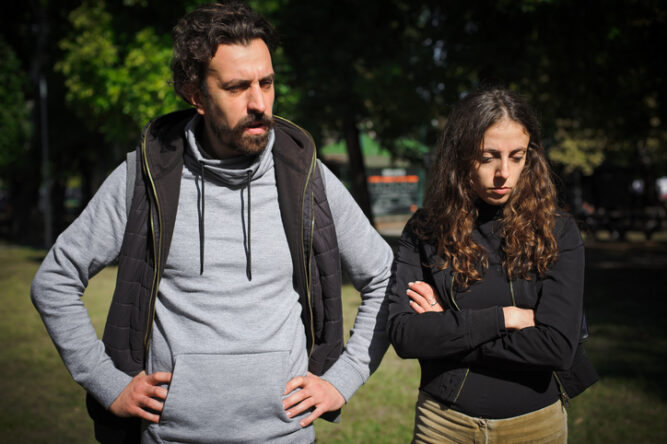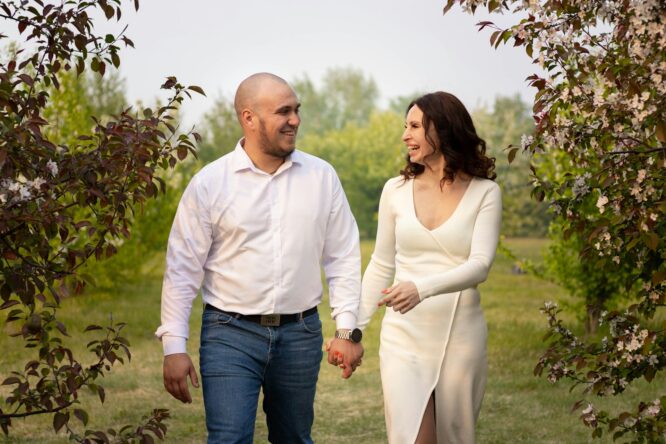When a relationship you thought would go the distance suddenly comes to an end, it can be unbearably sad, confusing, and even life-changing.

Not only do you have to confront the new reality of a life with someone you thought would always be there, but you also confront feelings like loneliness, loss of identity, and even more practical challenges like where you’ll live and what you’ll do about co-parenting if you happen to have kids together. Emotions are no doubt running high at this time, but you’ll get through it, especially if you do these things.
1. Accept the reality of the breakup.

Coming to terms with the end of a relationship can feel like the hardest thing you’ll ever do. It’s normal to experience shock, disbelief, or even denial, especially when everything around you feels so uncertain. But allowing yourself to feel the weight of what’s happened is a crucial part of the healing process, even if it feels uncomfortable at first. Accepting that this chapter has closed doesn’t mean you have to be okay with it right away. It just means you’re recognising that it’s over, and it’s okay to grieve. Denying reality can make the pain linger longer, but acceptance opens up space for healing, even if it feels daunting at the start.
2. Let yourself be sad.

Grief looks different for everyone, and there’s no set timeline for how long it should last. You might feel sadness, anger, or even unexpected relief — all of which are valid responses to such a big change. Grieving is your mind’s way of processing the loss and slowly making sense of everything. Instead of rushing to “feel better,” let yourself sit with those emotions. Suppressing them only makes the healing process harder and longer. Whether it’s writing down your thoughts, talking it out with a friend, or simply allowing yourself to feel, giving space for your emotions to flow naturally will help you process the painful time you’re going through.
3. Rebuild your routine.

One of the biggest adjustments after a breakup is the shift in your daily life. If you were used to sharing your mornings, evenings, or daily habits with your partner, the absence can leave you feeling adrift. Establishing a new routine is a powerful way to regain some sense of control and stability while you’re working through things. Start small, whether it’s taking a walk in the morning, signing up for a new class, or simply rediscovering hobbies you might have neglected. These small changes can help you feel grounded, and gradually, your day will start to reflect your needs. Creating structure — even in little ways — brings a reassuring balance back into your life.
4. Lean on your support network.

Going through a breakup doesn’t have to be a solitary experience. Lean on your friends, family, and other close connections for support. They can offer a listening ear, a bit of advice, or simply be there to provide comfort when you need it most. Instead of isolating yourself, reach out. Sharing your thoughts and feelings with people who care about you can lighten the emotional load and remind you that you’re not alone. Whether it’s a quick coffee catch-up or a longer evening spent with loved ones, being around supportive people can help you feel less overwhelmed.
5. Reflect on the relationship.

Once the initial shock has worn off, take a bit of time to reflect on the relationship itself. It can be helpful to think about both the good moments and the challenges you faced together. It’s not supposed to be an exercise focused on dwelling on mistakes or placing blame — it’s about understanding what you’ve learned and gained from the experience. Thinking about your needs, preferences, and boundaries will guide you in future relationships and help you make more mindful decisions moving forward. It’s all about growing from the past, not being stuck in it.
6. Look after yourself, even though it’s tough.

Heartbreak often takes a toll on both your emotional and physical health, which makes self-care even more important right now. Whether it’s getting enough sleep, eating nourishing meals, or engaging in activities that bring you joy, caring for yourself is a must. Self-care doesn’t just mean pampering yourself (though that can help too); it’s listening to your body and mind, and giving them what they need. Regular exercise, quiet moments for mindfulness, or even a relaxing evening with a book can help ground you. Taking time to look after yourself sends a powerful message that you’re worth prioritising, even when everything feels uncertain.
7. Resist the temptation to rush into something new.

After a breakup, it might feel tempting to quickly fill the emotional void with a new relationship or distractions, but rushing into something too soon can delay your healing process. While it’s natural to want to connect with other people, giving yourself the time and space to heal ensures that you’re emotionally ready for whatever comes next. Reclaiming who you are outside of the relationship will give you a clearer sense of self, and when the right time comes to open your heart to someone else, you’ll be in a much stronger place.
8. Set boundaries with your ex — and stick to them.

One of the most important things you can do after a breakup is to set clear boundaries with your ex. Whether it’s limiting contact or figuring out how you’ll interact going forward, boundaries give you the space you need to heal. Without them, you might find yourself slipping back into old patterns that prevent closure, like texting or talking about unresolved issues. Setting boundaries isn’t about being cold; it’s about protecting your emotional well-being and making sure you have the space to move on.
9. Consider therapy if you’re really struggling.

Sometimes, the emotions after a breakup can be too much to manage on your own. Speaking to a therapist or counsellor can provide a safe space to process those overwhelming feelings and gain some clarity. Therapy isn’t just for extreme situations; it’s a helpful resource for anyone navigating the complexities of a breakup. A therapist can offer coping strategies, perspectives, and guidance that make the healing process feel more manageable. Having an additional layer of support can really help you while you work through the breakup.
10. Rediscover who you are without your ex.

In long-term relationships, it’s easy to lose sight of who you are outside of the relationship. When that relationship ends, it can leave you feeling unanchored. This is the perfect opportunity to reconnect with parts of yourself you might have neglected. Dive into old hobbies, explore new passions, or focus on goals that are meaningful to you. You don’t need to totally reinvent yourself, but it’s never a bad idea to rediscover the person you were before the relationship — and perhaps discover new things along the way. It’s a journey of self-discovery that’s both empowering and fulfilling.
11. Find a way to manage mutual friendships.

Breakups often affect mutual friendships or shared social circles, and navigating these relationships can feel awkward or tricky. Communicating openly with friends can help smooth things over and avoid misunderstandings. If you need a bit of space from these mutual friends, that’s okay too. Focus on the connections that bring you comfort and positivity. Over time, these dynamics will shift, and new connections will naturally emerge.
12. Avoiding playing the blame game — it’s pointless.

It’s tempting to assign blame during a breakup, whether it’s towards your ex or even yourself. While blaming can offer temporary relief, it can also prevent you from fully moving forward. Rather than focusing on who’s to blame, try to approach the situation with understanding and compassion. Breakups usually happen because of deeper incompatibilities or unmet needs, not because one person is at fault. Shifting your perspective can help you release resentment and focus on healing.
13. Embrace the opportunity for growth.

The end of a relationship, while painful, is also an opportunity for personal growth. Reflecting on what you’ve learned, what you need, and what you desire for your future helps you grow stronger. This period of change can be a time to invest in yourself, explore new paths, and create a life that feels fulfilling on your own terms. It’s not about rushing through the process but embracing it, and using it to build a better version of yourself.
14. Celebrate even the smallest moves you make toward getting over it.

Healing often comes in small steps. Maybe it’s a day when you feel a little lighter or a moment when you realise you’ve moved on just a little bit. Recognising and celebrating these small victories is important. Progress doesn’t always come in big leaps, and every little step forward matters. Whether it’s laughing with friends or simply surviving a tough day, these moments show you that healing is happening, and that’s something to celebrate.
15. Try to be optimistic about the future.

After a breakup, it’s easy to feel uncertain about what’s next. But that uncertainty also holds the potential for new beginnings. Embracing the future as an opportunity to redefine your path can bring excitement and hope. Over time, the pain of the breakup will soften, and new opportunities will start to emerge. With an open heart and mind, you’ll move forward with renewed purpose and confidence, ready to build a fulfilling life.




